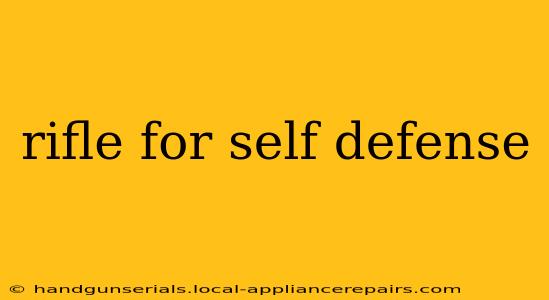Protecting yourself and your loved ones is paramount, and the decision to utilize a rifle for self-defense is a serious one. This guide provides in-depth information to help you make an informed choice, understanding the legal implications and practical considerations involved. Disclaimer: This information is for educational purposes only and should not be considered legal advice. Always consult with local law enforcement and legal professionals to ensure your actions comply with all applicable laws and regulations.
Understanding the Legal Landscape
Before even considering a specific rifle, it's crucial to understand the legal framework surrounding firearm ownership and self-defense in your area. Laws vary significantly by state and even locality. Factors to consider include:
- Registration requirements: Some jurisdictions mandate firearm registration, while others do not.
- Permitting: Obtaining a permit to purchase or carry a firearm might be necessary.
- Self-defense laws: "Stand your ground" laws and "duty to retreat" laws significantly impact the legal ramifications of using a firearm in self-defense.
- Restrictions on types of firearms: Certain types of rifles, such as assault rifles, may be restricted or prohibited entirely.
Failure to comply with these laws can result in severe penalties, including fines and imprisonment. Research your local and state laws thoroughly before proceeding.
Rifle Calibers for Self-Defense
The caliber of your rifle significantly impacts its effectiveness for self-defense. While there's no single "best" caliber, several options are commonly favored:
- .223 Remington/5.56x45mm NATO: A widely available and relatively inexpensive cartridge, known for its accuracy and manageable recoil. However, penetration can be a concern depending on the bullet type.
- .300 Blackout: Designed for shorter barrels, it offers excellent stopping power and reduced recoil compared to larger calibers.
- 7.62x39mm: A powerful and readily available cartridge, offering significant stopping power but with increased recoil.
- .308 Winchester/7.62x51mm NATO: A highly versatile and powerful cartridge, offering excellent range and stopping power, but with substantial recoil.
Choosing the right caliber depends on your experience level, physical capabilities, and the specific self-defense scenario you anticipate. Consider factors like recoil management, accuracy at typical self-defense ranges, and penetration capabilities.
Ammunition Considerations
Beyond the caliber, the type of ammunition you choose plays a vital role in your rifle's effectiveness. Consider:
- Fragmenting rounds: Designed to break apart upon impact, minimizing overpenetration.
- Expanding rounds: These rounds expand on impact, increasing their stopping power.
- Full metal jacket (FMJ) rounds: These rounds are generally less effective for self-defense due to their higher penetration risk. Use caution with FMJ rounds as they are more likely to cause collateral damage.
The choice of ammunition is crucial for minimizing risks to innocent bystanders.
Rifle Types for Home Defense
Several rifle types are suitable for home defense, each with advantages and disadvantages:
- AR-15 platform: Highly customizable and widely available, offering a variety of features for enhanced accuracy and ergonomics.
- Bolt-action rifles: Reliable and accurate, but slower to reload compared to semi-automatic options.
- Shotguns (with rifle sights): Effective at close range, but their spread pattern can cause collateral damage.
Beyond the Weapon: Training and Preparedness
Selecting the right rifle is only one piece of the puzzle. Proper training is paramount. You need to be proficient in safe handling, proper aiming techniques, and effective shooting positions. Consider professional training courses to hone your skills and build confidence.
Furthermore, consider other aspects of preparedness:
- Home security measures: Reinforced doors, alarm systems, and adequate lighting enhance your overall security.
- Emergency plan: Developing a comprehensive plan for handling a self-defense situation is crucial.
- Legal counsel: Having access to legal counsel familiar with self-defense laws is vital.
Choosing a rifle for self-defense is a complex decision with significant legal and ethical implications. Thorough research, appropriate training, and a clear understanding of local laws are essential before making this important choice. Remember, the responsibility for safe and legal firearm ownership rests solely with the owner.

